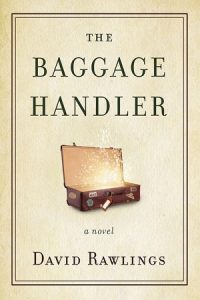Over 25 years, David Rawlings has built a career writing nonfiction, from sports journalism and copywriting to corporate communication. His debut novel, The Baggage Handler (Thomas Nelson), is a modern-day parable drawing comparisons to The Traveler’s Gift by Andy Andrews and Dinner with a Perfect Stranger by David Gregory. In The Baggage Handler, three travelers discover there’s more in their baggage than what they packed—and carrying it is slowing them down in ways they can’t imagine. In this interview, David shares the origins of the story, explains how his fiction contrasts with his nonfiction work, and reveals how his faith impacts him as a storyteller…
David, The Baggage Handler is a modern-day parable about the burdens that weigh us down. What inspired you to write about this idea?
 The Baggage Handler itself was borne out of rejection. My first manuscript–about reality TV and churches–finaled in a range of fiction awards, but I couldn’t get industry interested in it.
The Baggage Handler itself was borne out of rejection. My first manuscript–about reality TV and churches–finaled in a range of fiction awards, but I couldn’t get industry interested in it.
Someone suggested for my next novel maybe I should focus on “life lesson” stories. I widened my reading and then one night at 9 PM The Baggage Handler arrived. It pretty much downloaded into my head–one moment I was reading in bed, the next I was furiously tapping away at my laptop. When I next checked the clock, it was 1 a.m., and I had the story, the characters, plot, twists, structure–almost everything.
That hasn’t happened before or since with books two and three, but I’m glad it did with The Baggage Handler.
I’m also inspired by the way Jesus spoke to people. His most powerful interactions with people asked basic questions that got to the heart of their issues and forced them to consider their actions and lives.
How did you come to explore this idea through these particular characters?
I’m the type of person who wants to talk about the deeper things in life rather than just wade around in the shallows with small talk, so issues like the concept of dealing with baggage have always been a part of conversations I have. I guess it was just there not too far under the surface.
It was through this process of wanting to know more that I explored the idea of baggage–just noticing how people dealt with (or didn’t deal with) the things they were carrying. The impact of avoiding it and the relief of addressing it. And over my professional career I’ve had a number of connections with counselors in the health field, so drawing from their knowledge was also key to working out how to best approach the topic.
This is your debut novel, but you have a lot of writing experience. How does this book compare/contrast with your regular body or work? What made you want to write a novel now?
I’m a professional copywriter, with experience ranging from sports journalism to advertising campaigns to direct marketing to online content development. For nearly 30 years, I’ve put words on the page or the screen to put food on the table and my work is about getting the messages of my clients across. It’s very much a business approach.
Fiction writing was always something I was going to do—one day. All these ideas for novels came to me, which I politely filed away for that mythical day in the future when all the financial ducks were lined up. That would allow me to comfortably approach the task of writing without the expectation of getting paid.
When I had enough money or enough clients behind me, so I could safely take the plunge into what is a vocation not flushed with cash, I would take my ideas out of my folder, and write fiction. (I still have 17 storyboards sitting there waiting to be fleshed out into living breathing stories).
Then God challenged me. He reminded me that His gift of notes with story ideas and novels on them wasn’t just it. He hadn’t just given me stories to tell, He had also given me the ability to tell it and He would provide the room in which to tell it. He took my writing dream, flipped it upside down and then stood back and said two words to me.
I would have loved to have heard: “Publishing House.” Now that I could live with. I wanted to hear: “Great Story.” Now that would be the highest endorsement of my writing. A part of me wanted those two words to be “Best Seller.”
But no.
The two words I heard were these. “Trust Me.” Two words no control freak wants to hear. So, it is taking me a while, but I am getting there.
How does your faith impact the way you approach writing fiction?
 My values underpin who I am and how I approach life, so they are intrinsically linked to my work. They have to be – good writing comes from deep within, and that’s where my faith is.
My values underpin who I am and how I approach life, so they are intrinsically linked to my work. They have to be – good writing comes from deep within, and that’s where my faith is.
The biggest impact my faith has on my writing is how, or even why, I write. In the New Testament, I admire the way Jesus engaged with people. He presented eternal truth in ways they could be understood – issues like redemption, salvation or forgiveness may have been beyond the understanding of some, but they’d all lost a coin. Or knew someone who had lost a sheep. Or knew someone whose big brother wanting his share of the inheritance cake right now.
I’m writing modern-day parables in a similar vein – truth wrapped in a universal story that is relatable. For The Baggage Handler, it’s about losing your luggage at the airport telling a story of the baggage we carry. For the next book–The Camera Never Lies–it’s about cameras and photos sharing secrets as a way of talking about honesty in relationships.
What do you consider the best ways for readers to support their favorite authors?
Buy their books–obviously–but also give them feedback about the parts of their writing you connect with. Writers can live as if they’re mired in a swamp of self-doubt, so letting them know you appreciated their work can be significant.
And leave reviews, because it also helps other readers make purchase decisions. But overall, appreciate the hard work that goes into their writing, because good books – really good ones – don’t just appear at the end of one hard day of writing.
Visit David Rawlings’ author page:
https://www.familyfiction.com/authors/david-rawlings/
The Baggage Handler
David Rawlings
Thomas Nelson


